South American Solstice Sojourn, chapter 1
Traveling with my señora de Asunción
I left for Paraguay from Miami, which was good practice, since it's one of the few major cities in the US I know of where people come up to you and begin by speaking in Spanish. To
minimize air miles, I chose t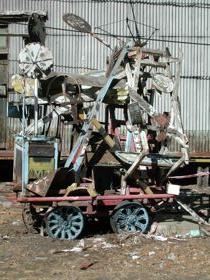 o fly direct in & out of Buenos Aires from Miami, and then take the 17 hour bus ride from there to Asunción. I worked in one day in Buenos Aires - pretty city, much more European than other places I'd been in Latin America. On the advice of Marco, I headed for the neighborhood of "Palermo Viejo," and living up to its name, the pizza was excellent: nice thin crust, minimalist on the toppings, flavorful but not overwhelming sauce. Nevertheless, I was surprised to find out that it was an unusual request to get hot peppers on pizza, and all they had on the premises was black pepper (not even on the tables). No red peppers and no hot sauce. Puzzling. I had used up the last of my bottle of hot sauce on the road in Florida, and figured that I would have no problems restocking when I hit the ground in Argentina. It turns out, though, that it was not just this restaurant that was spice deficient. I went into a supermarket and asked for hot sauce, using all of the words I could think of to communicate my needs - even throwing in a few Brasilian terms for hot sauce and hot peppers for good measure. Finally a light appeared in the supermarket worker's eyes and he led me to the ketchup section.
o fly direct in & out of Buenos Aires from Miami, and then take the 17 hour bus ride from there to Asunción. I worked in one day in Buenos Aires - pretty city, much more European than other places I'd been in Latin America. On the advice of Marco, I headed for the neighborhood of "Palermo Viejo," and living up to its name, the pizza was excellent: nice thin crust, minimalist on the toppings, flavorful but not overwhelming sauce. Nevertheless, I was surprised to find out that it was an unusual request to get hot peppers on pizza, and all they had on the premises was black pepper (not even on the tables). No red peppers and no hot sauce. Puzzling. I had used up the last of my bottle of hot sauce on the road in Florida, and figured that I would have no problems restocking when I hit the ground in Argentina. It turns out, though, that it was not just this restaurant that was spice deficient. I went into a supermarket and asked for hot sauce, using all of the words I could think of to communicate my needs - even throwing in a few Brasilian terms for hot sauce and hot peppers for good measure. Finally a light appeared in the supermarket worker's eyes and he led me to the ketchup section.
So Argentina seems nice enough, but ranks only "mild" on the spicy scale. As we will see b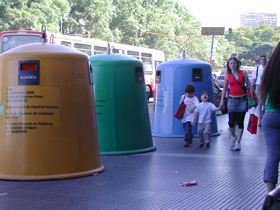 elow, they are also deficient in their uses of Yerba Mate (Ilex paraguayensis) in comparison to the true home of that lovely herb.
elow, they are also deficient in their uses of Yerba Mate (Ilex paraguayensis) in comparison to the true home of that lovely herb.
They have nice double decker buses for long distance travel between  Buenos Aires and Asunción, and I chose the front seat of the upper level. This afforded a bit of extra stretching room, but placed me directly in front of the blaring television. Among other things, I learned that CCR is super popular in Paraguay before finally managing to get some shut eye. It also turned out that this huge, vertical front-facing window was an insect death trap. Horrifying, actually.
Buenos Aires and Asunción, and I chose the front seat of the upper level. This afforded a bit of extra stretching room, but placed me directly in front of the blaring television. Among other things, I learned that CCR is super popular in Paraguay before finally managing to get some shut eye. It also turned out that this huge, vertical front-facing window was an insect death trap. Horrifying, actually.
While I was in Argentina, where I didn't need a visa to enter, I went to a travel agency to ask if I needed a visa to cross by land into Paraguay. The lady at the agency did a little computer searching, and then said confidently: "you don't need one."
The officials at the border, though, had a different opinion: no visa, no entry. Luckilly it was a weekday during the day, and the Argentinian border town had a Paraguayan consulate. Turns out I needed 2 passport sized photos, a photocopy of my passport, and the fee. There were two bank machines in town. The first one had one of the cononical 3 block-long lines leading to the bank machine. I suspect that bank lines in Latin America are an example of a positive feedback loop. Once the line starts to get a little long, a few paranoid people see the line and decide that they better get in line to get money before the bank runs out (as they occasionally do). This makes the line longer, more people get worried, the line gets longer, and then it's a self fulfilling prophesy: with such a long line, then the bank probably will run out of money, so then everyone gets in line.
Thankfully, the second bank was not undergoing a cash panic, so after getting my visa fees in Paraguayan currency, and the easily obtainable photos and photocopies (a cottage industry was 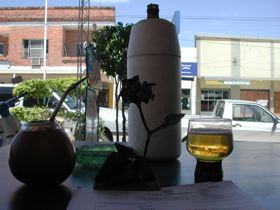 present in this border town, undoubtedly for this very purpose), I went back to the consulate to find that consulate fees are only payable in US dollars (?!). So I went back to the town center to change my recently withdrawn Guarani into US dollars, and nearly got totally screwed (about 10 fold) by a unscrupulous money changer. I had seen a sign at the border with the correct Guarani to US dollar exchange rate, so after questioning him on his unique exchange rate he pointed me to another money changer, as if to say "Oh! You want the REAL exchange rate? Well why didn't you say so! You need to go talk to Manuel..."
present in this border town, undoubtedly for this very purpose), I went back to the consulate to find that consulate fees are only payable in US dollars (?!). So I went back to the town center to change my recently withdrawn Guarani into US dollars, and nearly got totally screwed (about 10 fold) by a unscrupulous money changer. I had seen a sign at the border with the correct Guarani to US dollar exchange rate, so after questioning him on his unique exchange rate he pointed me to another money changer, as if to say "Oh! You want the REAL exchange rate? Well why didn't you say so! You need to go talk to Manuel..."
So I finally got the visa, and caught a local bus back to the border, where Jorge the border guy (who insisted on my calling him "George"), was very helpful in my getting a free seat on the next bus -from the company I used- heading to Asunción. George was also very worried about making sure I got in touch with Beatriz, who was going to meet me at the bus station in Asunción. Bottom line: unlike the US-Canada border guards, George actually wanted to help me get into the country.
Paraguay is one of only two landlocked countries in South America (the other is Bolivia). In both cases, sea access was stolen by greedy neighboring countries. Bolivia lost its tiny amount of sea access to Chile (as if they needed more!), and Paraguay was ganged up on in 1865 by its three neighbors (Argentina, Brasil & Uruguay), presumably in retribution for the fact that Paraguay had, at the time, recently opted out of the colonial economic connection to Europe, adopting a self-sustaining economic path instead. This was not to be tolerated, and they lost their sea access as punishment. The war was largely financed by the Bank of London and the Rothschild's. Paraguay and Bolivia are also distinguished as, by far, the two poorest countries in southern South America. As icing on the cake, they fought a pointless and bloody border war between themselves in the 30's.
Paraguay also has the distinction of having had the longest holdout among all of the US-supported 20th 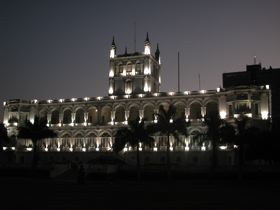 century latinamerican dictatorships- Alberto Stroessner was finally deposed in a coup in 1989. Incredibly, his political party - the Colorados - still hold power in Paraguay to this day. Yesterday morning, the local ABC daily newspaper (no connection to the Disney-owned US network) had a blistering editorial on the continued corrupt rule of the "neo fascist" Colorado party (their words), who have failed in essentially every way to improve the lot of the people. Although the opposition is reportedly not that much better, I think that the symbolism of the people dumping the Colorado party at last in this upcoming
century latinamerican dictatorships- Alberto Stroessner was finally deposed in a coup in 1989. Incredibly, his political party - the Colorados - still hold power in Paraguay to this day. Yesterday morning, the local ABC daily newspaper (no connection to the Disney-owned US network) had a blistering editorial on the continued corrupt rule of the "neo fascist" Colorado party (their words), who have failed in essentially every way to improve the lot of the people. Although the opposition is reportedly not that much better, I think that the symbolism of the people dumping the Colorado party at last in this upcoming 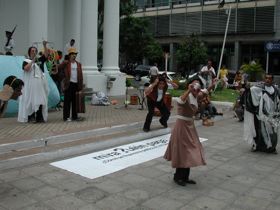 election cycle in April will be a good first step. At the moment, the Colorado party is embroiled in, and fracturing over, a voting scandal stemming from their primary elections last month. Thus, they may not be long in power, por suerte.
election cycle in April will be a good first step. At the moment, the Colorado party is embroiled in, and fracturing over, a voting scandal stemming from their primary elections last month. Thus, they may not be long in power, por suerte.
One clear indication of the lack of any effort to improve the lot of the people is the sorry state of transit in Asunción. Although bus service is pretty frequent (which it needs to be, as it is the lifeblood of the city), the buses are really old (1960's era Brasilian buses), and, shockingly, fares are about double those in Buenos Aires. There is no system of transfers, so the people often take incredibly circuitous milk-run routes to get from point A to point B, so they can only pay one fare. There is absolutely no effort to transition here to cleaner burning fuels, so the air pollution in the city is pretty bad. Many of the buses have their exhaust pipes on the sides, so oftentimes the rear seats on the bus seem like you're sitting right behind the exhaust pipe- because you are!
Despite these seemingly insurmountable problems, the people are incredibly resilient, and are full of 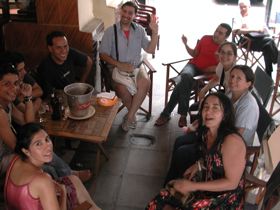 the joy of existing in the moment. For example, it was a veritable whirlwind of christmas/new years parties here in Paraguay. The two holidays are pretty much one big holiday with a week of partying in between. On christmas eve, there's a countdown at midnight and fireworks, tons of eating and partying and drinking. Except for the requisite nativity scene in every house, which are actually fairly trippy and often include figurines of the infamous Amanita muscaria mushroom (the hallucinogenic red one with the
the joy of existing in the moment. For example, it was a veritable whirlwind of christmas/new years parties here in Paraguay. The two holidays are pretty much one big holiday with a week of partying in between. On christmas eve, there's a countdown at midnight and fireworks, tons of eating and partying and drinking. Except for the requisite nativity scene in every house, which are actually fairly trippy and often include figurines of the infamous Amanita muscaria mushroom (the hallucinogenic red one with the 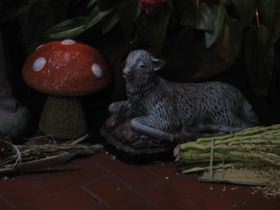 white spots), Jesus doesn't seem to play such a big part in these festivities. It's more about hanging out late at night, drinking with friends and family, and telling stories. This was all repeated on New Years Eve, with the addition of wearing white, standing on a chair at midnight and eating large grapes - all for good luck for 2008. There's also this odd tradition of striking one's bed with four or five 1000 Guarani bills (the local currency, equivalent of about 25 cents each) while yelling out larger and larger amounts of money - an attempt, it seems, to transmogrify the 1000 guarani notes into 1 million guarani notes and more.
white spots), Jesus doesn't seem to play such a big part in these festivities. It's more about hanging out late at night, drinking with friends and family, and telling stories. This was all repeated on New Years Eve, with the addition of wearing white, standing on a chair at midnight and eating large grapes - all for good luck for 2008. There's also this odd tradition of striking one's bed with four or five 1000 Guarani bills (the local currency, equivalent of about 25 cents each) while yelling out larger and larger amounts of money - an attempt, it seems, to transmogrify the 1000 guarani notes into 1 million guarani notes and more.
Being vegan in Asunción is like making love hanging upside down without using your hands: it's possible to do, but why would you try? The national dishes - chipa guazu and sopa paraguaya - are all about eggs and cheese, and are, incidentally, totally delicious. Still, even our decision to back off to straight vegetarian here has proved challenging, where "vegetariano" is generally interpreted either as "vegetables along with meat" or "chicken." The only vegetarian restaurants are the ones run by asian buddhists in downtown (fantastic cabbage rolls stuffed with tofu). I had visions of falafel dancing in my head when I saw the "Comida Arabe" restaurants scattered around town, but they, too, are all about meat; even humus is a rare find. The tofu factory here, has been a...well...a buddha send.
Next chapters...."Brasil: The promised land across the river" and "What are we gonna do with all these freakin mangos?"
Peace y'all! Love bug
p.s. Bee sends her love
Posted: January 21, 2008
Updated (with cool rollovers on the photos): January 27, 2008
Go to: Chapter 2 * Chapter 3
 o fly direct in & out of Buenos Aires from Miami, and then take the 17 hour bus ride from there to Asunción. I worked in one day in Buenos Aires - pretty city, much more European than other places I'd been in Latin America. On the advice of Marco, I headed for the neighborhood of "Palermo Viejo," and living up to its name, the pizza was excellent: nice thin crust, minimalist on the toppings, flavorful but not overwhelming sauce. Nevertheless, I was surprised to find out that it was an unusual request to get hot peppers on pizza, and all they had on the premises was black pepper (not even on the tables). No red peppers and no hot sauce. Puzzling. I had used up the last of my bottle of hot sauce on the road in Florida, and figured that I would have no problems restocking when I hit the ground in Argentina. It turns out, though, that it was not just this restaurant that was spice deficient. I went into a supermarket and asked for hot sauce, using all of the words I could think of to communicate my needs - even throwing in a few Brasilian terms for hot sauce and hot peppers for good measure. Finally a light appeared in the supermarket worker's eyes and he led me to the ketchup section.
o fly direct in & out of Buenos Aires from Miami, and then take the 17 hour bus ride from there to Asunción. I worked in one day in Buenos Aires - pretty city, much more European than other places I'd been in Latin America. On the advice of Marco, I headed for the neighborhood of "Palermo Viejo," and living up to its name, the pizza was excellent: nice thin crust, minimalist on the toppings, flavorful but not overwhelming sauce. Nevertheless, I was surprised to find out that it was an unusual request to get hot peppers on pizza, and all they had on the premises was black pepper (not even on the tables). No red peppers and no hot sauce. Puzzling. I had used up the last of my bottle of hot sauce on the road in Florida, and figured that I would have no problems restocking when I hit the ground in Argentina. It turns out, though, that it was not just this restaurant that was spice deficient. I went into a supermarket and asked for hot sauce, using all of the words I could think of to communicate my needs - even throwing in a few Brasilian terms for hot sauce and hot peppers for good measure. Finally a light appeared in the supermarket worker's eyes and he led me to the ketchup section.





